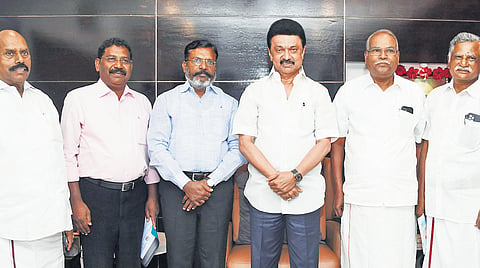

CHENNAI: With the Assembly elections just a year away, the aura of invincibility surrounding the DMK alliance, which got strengthened after the bloc’s landslide victory in 2024 Lok Sabha polls, has not waned fully.
The DMK’s fight for states’ rights, its time-tested organisational structure, ideological cohesion of the allies, and the opposition’s perceived inability to create a strong narrative against the government that could resonate with the electorate at large may have given the ruling alliance an upper hand in the perception battle.
Although the AIADMK and BJP have revived their alliance after nearly two years, in a bid to consolidate the “anti-incumbency” votes, it is yet to be seen how successful this alliance will be in achieving its objective, considering the bitter rivalry they showed towards each other in 2024. Besides, the consolidation could also be disrupted by new entrants such as the TVK.
It may be noted that the DMK president and Chief Minister M K Stalin consistently describes the alliance he leads as an ideological one rather than merely political. In contrast, AIADMK which opposed BJP’s policies like the three-language formula and the Waqf Amendment Act, had to defend the new alliance by arguing that “coalition and ideology are different”.
To his credit, Stalin has not only managed to maintain absolute control over the party but has also been astute in leveraging the experience and influence of veteran leaders, not only within the government and the party but also in broader political engagements. Stalin’s well-calibrated slogan, ‘Tamil Nadu Poradum, Tamil Nadu Vellum’ (TN will fight, TN will win), is a clever move that positioned him as the face of resistance to the union government that appears anti-federal.
Moreover, he remains connected to leaders, writers and researchers associated with the Dravidian movement and ideology, and has steadily built an image of a staunch defender of states’ rights, as well as protecting their language and culture.
For instance, establishing the antiquity of Tamil history through archaeological evidence, celebrating Bharathidasan’s birthday as Tamil Week, nationalising the works of Tamil scholars and writers, and building memorials for revered Tamil icons. This has endeared him to Tamil enthusiasts and numerous smaller outfits that shape, to some extent, the political undercurrent, an influence the present AIADMK continues to overlook.
It is worth noting that under the Ungal Thoguthiyil Mudhalamaichar scheme, Stalin gathered details of long-pending demands from all 234 MLAs in their respective constituencies through district collectors and prioritised their implementation by allocating dedicated funds.
Deputy Chief Minister Udhayanidhi Stalin, in a recent Assembly session, informed that 1,253 such projects have been undertaken over the past two years at a cost of `14,466 crore.
Stalin has also instructed his ministers, MLAs and functionaries to spend more time in their constituencies and districts, indicating his plan to build a strong grassroots foundation for the upcoming election, upon which higher-level political narratives can be effectively set by the party.
Moreover, Stalin has made the party’s various wings more active than before, especially its youth and legal wings.
AIADMK general secretary Edappadi K Palaniswami, by going back on his promise to not align with the BJP, has been put on the defensive, at least for now, in assuaging the concerns of sections of his party functionaries and cadre over the decision. However, the party is hoping to intensify its attack on the DMK, mainly on the alleged issues of corruption and deterioration of law and order.
While the law-and-order plank may have some traction, it is uncertain whether it can sway the electorate — especially given the criticisms AIADMK faced in the past during incidents like the Thoothukudi violence and Pollachi sexual assault.
Regarding the issue of corruption, DMK IT wing advisor Govi Lenin stated that there are no corruption charges against the present government. “The cases against a few ministers are over a decade old and were foisted by the previous government. Even if the BJP unleashes its investigative agencies against DMK leaders, hoping to replicate the tactics used in Delhi or Jharkhand, they should know that the people of Tamil Nadu won’t be fooled,” he said.